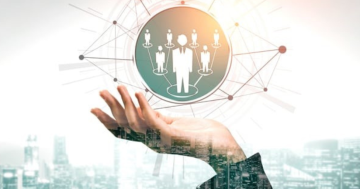According to Tomas Chamorro-Premuzic and Katarina Berg* research has shown that when employees feel that they belong to a team or organisation, they tend to perform better and experience higher levels of engagement and well-being.
 There is more to human existence than work; however, it is clear that if we’re are going to devote a third of our adult lives to our jobs, it is quite helpful to find them meaningful.
There is more to human existence than work; however, it is clear that if we’re are going to devote a third of our adult lives to our jobs, it is quite helpful to find them meaningful.
The degree of meaning and purpose you derive from work may be the biggest difference between a job and a career, and psychological research has consistently shown that when employees feel that they belong to a team or organisation — in the sense that it aligns with their values, and enables them to express important aspects of their identity — they will not only tend to perform better, but also experience higher levels of engagement and well-being.
In contrast, a lack of belonging will increase the risk of alienation, burnout, and underperformance.
Given this evidence, organisations need to foster belonging in their employees, and modern managers need to act as agents of meaning and purpose if they wish to retain their employees.
That is in fact much harder than attracting new talent.
This feeling of belonging has become challenged over the past year plus as we’ve shifted away from in-person interactions and found ourselves relying on video calls and screen activities to stay connected.
HR and senior executives have encountered new demands when it comes to creating and sustaining a sense of real community, and are realising that new skill sets are needed.
It is not that leaders are disinterested in boosting a sense of belonging among their employees, but rather, that there isn’t a simple way to do it.
This is especially true in an age of hybrid work, when organisations are not only trying to increase the flexibility of working arrangements, but are also working on offering remote policies, which can decrease opportunities to “live and breathe” the culture in person.
To be clear, culture does not go away when the office is a bit emptier, nor does it cease to evolve.
However, as the experience of culture the way we have gotten used to defining it has become more diffused, elusive, and subjective, it’s harder for organisations to connect with people and connect them through a homogeneous cultural experience.
If work is something you do and not a place you come to, then maybe it is about time we got rid of the notion that culture sits within the four walls of the office.
We can embrace the fact that we are all living in a gigantic experiment where technology and what we used to call a workplace no longer have any limitations.
We can instead focus on human needs and wants to stay healthy, productive, creative, social, and inspired.
In order to address this, organisations (and leaders) must navigate three major challenges:
- Balancing the tension between a strong culture and effective DIB (diversity-inclusion-belonging) practices.
To elevate the importance of diversity, companies need to harness an inclusive culture where people feel valued and respected, and perhaps even recruited, for their differences.
Spotify, where Katarina is the Chief Human Resources Officer, defines diversity as being invited to the party; inclusion as being asked to dance, and belonging as when they play your song.
Sounds simple? Perhaps, but when you want to dance with a wide range of personalities, and you want to cater to everyone’s unique preferences, you risk having no one come to your club.
People — whether at work or in any area of life — gravitate towards simple, clear-cut propositions, and just as nuanced rationality is unlikely to win you political elections (it requires people to be open-minded rather than tribal), a culture that tries to be everything to everyone could easily become interesting to very few.
This is why “culture fit” is a popular approach to hiring and promoting talent — it is a lot easier than DIB.
When you finally start to talk about the fact that diversity comes with a cost, things like hiring for culture add-on (ensuring that whoever joins adds something new to the team) rather than fit really come to life.
Managers and employees do have to understand and commit to this extra cost since it will come with benefits — but much later.
Diversity will initially slow you down, it will create misunderstandings, and when people come from different, inequitable backgrounds, you will have opinions and worlds colliding.
And how do you master the noble art of dealing with that?
- Retaining the social element of work, even when people continue to work from home.
Work is not just a vehicle for productivity, but an opportunity to have meaningful connections with others, which can enhance our overall experience of life.
This is also the main reason why many people miss the office: the desire to regain some of the lost magic that makes work more human.
Those who are eager — and able — to return to the office will probably experience a sense of belonging, or perhaps it is their very sense of belonging that propels them to return to the office.
But what are employers going to do for those you can’t return, due to covid or related personal reasons?
If, aside from personal circumstances and constraints, people decide to remain at home or continue to work in physical distance from others, how can we truly cater to their need for meaning and purpose, and ensure that they feel included in the next chapter of the company’s cultural evolution?
As INSEAD’s Gianpiero Petriglieri pointed out, for all the talk of the future of work, the real reason we’ll go back to the office is a cocktail of 50 per cent social pleasure and 50 per cent social pressure.
We want to see people, and we don’t want them not to see us.
If he is right, then organisations should worry about the fact that they are not truly attracting people back to the office because they feel any sense of belonging there, but due to the more superficial and mundane reason of catching up with colleagues, and complying with management’s preferences (whether these are explicitly stated or not).
How do you set your “children” free, trust that they will be ok, and know that the family is always there to support and care for them?
And, when they feel lonely and miss the “third room” — the camaraderie and spontaneous socialization — how do you help them rekindle relationships, feel a stronger connection, and remain an active part of the cultural evolution?
In Spotify’s recent WFH employee survey, the biggest concern was indeed how to nurture a sense of belonging while being at home, which led the business to unpack what that means not just now, but also in the future.
It prompted discussions about what leaders need to keep doing, stop doing, and improve upon to enable a relevant sense of community and culture while people are distributed and in different circumstances.
We are, above all, social beings and creatures of habit.
But no matter how many virtual and digital social happenings we have added to our schedules, it doesn’t measure up to the real thing.
People are longing for the connective tissue and social glue we once took for granted.
- Having the courage to let the culture evolve.
All cultures are the product of legacies — in particular the historical values of their leaders, or at least their impact.
The temptation to cling to the past is always strong. But big, external changes force cultures to evolve.
And when cultures survive — or even thrive — in the face of external changes, the temptation is to augment them.
However, each crisis gives way to a new version of the world, and just because a system managed to survive an actual crisis doesn’t mean there is no need to change it.
It’s like a heavy smoker, drinker, or overeater who is hospitalised from a heart attack and manages to survive — the answer is not to smoke, drink, or eat more, but to change those habits.
And changing habits involves replacing old practices with new ones, rather than relishing the opportunity to go back to the past.
It is often said that we should learn from failure, and that it’s a lot harder to learn from success — because even when we are lucky, we are tempted to think we were just smart, which is the best way to do something dumb in the future.
What is clear is that one cannot draw too many conclusions from surveys and close dialogue with the employees during a pandemic, since people are living with fear, anger, and depression.
As we emerge from the pandemic, we need to figure out how to create a sense of belonging and community within organisations where the fear, anger, and depression are being replaced by choice, flexibility, and freedom.
Although nobody knows what the future will bring, we can expect a wide range of approaches to making hybrid work actually work.
Perhaps offices will play more of a collaborative, creative, and innovative role, serving as a catalyst for stimulating in-person encounters, and checking-in with colleagues to get our minimum dose of physical contact.
Offices may soon become our social and community nodes, rather the place you come in to do your work.
They most likely will be important for internal networking, especially for Gen C, or “Generation Covid,” the generation that will hit the job market after Gen Z.
No matter what approach you choose, it is always important to make it explicit, to ensure that people understand your rationale, and to have the humility and data-informed mindset to evaluate what works, and what doesn’t, and to be ready to adjust accordingly.
*Tomas Chamorro-Premuzic is the Chief Talent Scientist at ManpowerGroup. He can be contacted on Twitter at @drtcp. Katarina Berg is CHRO & global head of Strategy Operations at Spotify.
This article first appeared at hbr.org.











